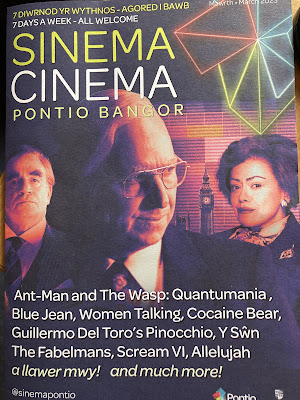In Welsh class, some attention was dedicated to a Welsh film that had come out: Y Sŵn, or the noise. It sounded interesting. I had also seen in an email that there was a public lecture coming up. It was about the struggle for compensation of quarry workers with silicosis. The title explicitly involved the word ‘llwch’, or dust. And then I had a look. They were at the same time! Now I would have to choose.
I chose the lecture. That would be a one-off. There might be another opportunity to see the film! I could potentially see it on the Saturday night. So after work I ate my sandwiches and went to the building where the lecture would be. It was closed! And there was no one to be seen. Was something wrong? And then two other ladies appeared, with the same mission. Then I checked the email again and realised the lecture was actually a week later. But that decided it; I would just go to the film instead. That started half an hour later.
The film was about an event that is very famous in Wales, but that I had never heard of before coming here and learning about Welsh history. In Wales there was a noteworthy movement fighting for the Welsh language and more autonomy for Wales. One of the important people in this movement was Gwynfor Evans; for a long time the leader of the Welsh National party, and the first MP of that party in Westminster. The movement had had a boost in reaction to the flooding of the Tryweryn valley. And it had been campaigning for a Welsh language television channel. The government had promised that that would come, but then in 1979 it change its mind. And especially the Society for the Welsh language took exception to that.
And then Gwynfor Evans made a drastic decision. He announced that he would go on hunger strike if the government wouldn't change its mind back, and stay on hunger strike until they would. And if they wouldn't, well, that would be the end.
Long story short; it worked, and the Welsh channel is still going strong.
So what was the film like? I enjoyed it! The story had got a bit festooned with unlikely details for dramatic and/or comedic effect, but I didn’t mind that too much. They also didn't shy away from having archive footage mixed in with the re-imagining with actors. And I have no idea how close they stayed to the actual Gwynfor Evans, they did give a plausible rendition. And it increased my respect for the man. What a dedication to a cause that was so close to hopeless! I'm glad I went. I don't think I can make the dusty talk next week, but this way at least I've got some Welsh culture in!



No comments:
Post a Comment